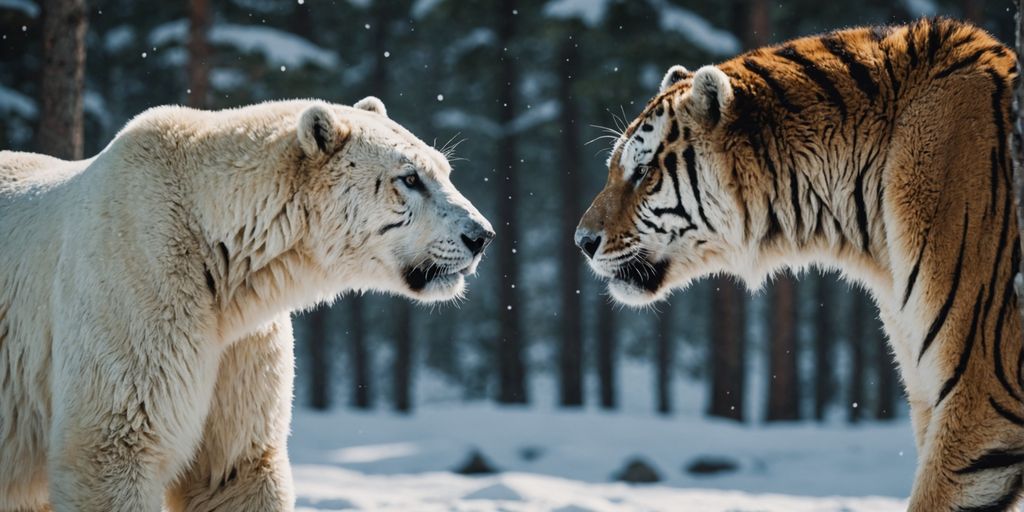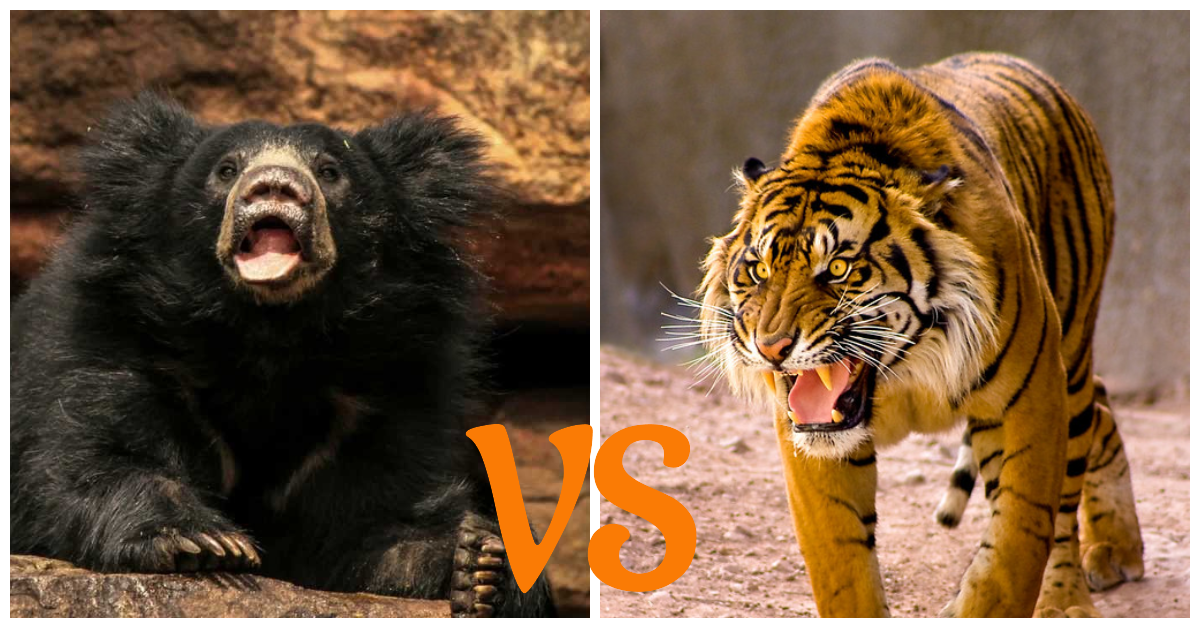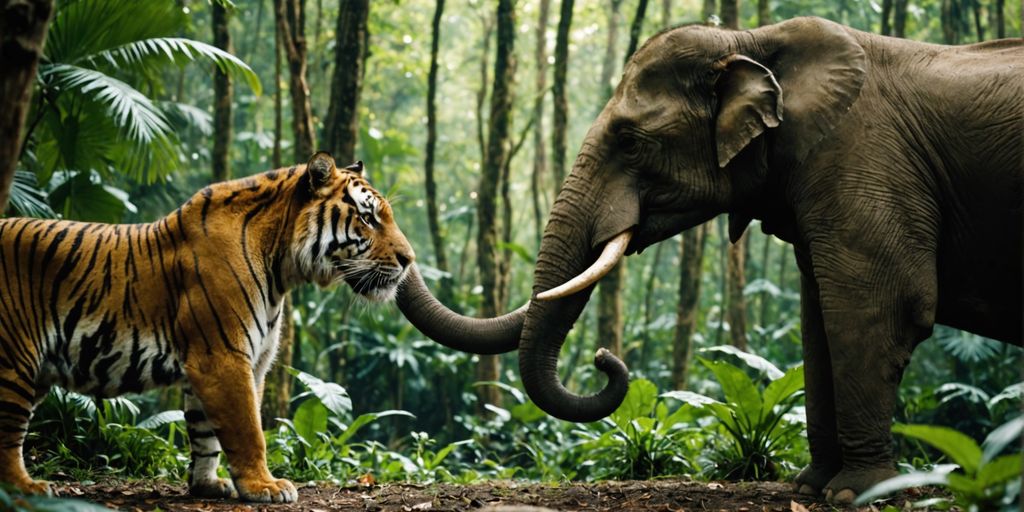Your Cart is Empty
🙏HELP US SAVE TIGERS!🐅 WE DONATE 1% OF OUR SALES TO WILDLIFE ORGANIZATIONS ( WWF ...)
Menu

🙏HELP US SAVE TIGERS!🐅 WE DONATE 1% OF OUR SALES TO WILDLIFE ORGANIZATIONS ( WWF ...)
Epic Battle: Polar Bear vs Tiger, who win?
July 11, 2024 8 min read

Welcome to an exciting showdown between two of nature's most powerful predators: the Polar Bear and the Tiger. This article will explore various aspects of these incredible animals to determine which one would likely come out on top in a hypothetical battle. We'll look at their habitats, diets, behaviors, and physical attributes, among other factors. So, who do you think will win in this epic battle?
Key Takeaways
-
Polar Bears and Tigers are both apex predators, but they live in very different environments.
-
Polar Bears are larger and stronger, but Tigers are faster and more agile.
-
The outcome of a fight would depend on many factors, including the environment and the condition of each animal.
-
Both animals have unique adaptations that help them survive in their respective habitats.
-
Conservation efforts are crucial for protecting these magnificent creatures and their ecosystems.
Introduction
Background
The idea of a battle between a polar bear and a tiger sparks curiosity and debate. These two apex predators, each reigning supreme in their respective habitats, have fascinated humans for centuries. Understanding their differences and strengths can provide insight into the natural world.
Purpose
This article aims to explore the hypothetical scenario of a polar bear facing off against a tiger. By examining their physical attributes, behaviors, and survival adaptations, we can better appreciate these magnificent creatures.
Scope
We will delve into various aspects of both animals, including their habitats, diets, and hunting techniques. Additionally, we will compare their physical characteristics and survival strategies to determine which animal would likely emerge victorious in a confrontation.
The Winner: A Quick Answer
When it comes to a showdown between a polar bear and a tiger, the polar bear is the likely victor in most scenarios. Polar bears have several advantages that make them formidable opponents. They are larger, have thicker fur, and possess stronger claws. These attributes give them an edge in a fight.
Likely victor in most scenarios
In most cases, the polar bear would come out on top. Their size and strength are unmatched, and they can fight on their hind legs, giving them a strategic advantage.
Key factors influencing the outcome
Several factors play a role in determining the winner:
-
Size and Weight: Polar bears are generally larger and heavier than tigers.
-
Strength: Their powerful muscles and strong claws make them deadly in combat.
-
Fur and Fat: The thick fur and fat layer of polar bears provide protection against attacks.
In conclusion, while both animals are incredibly powerful, the polar bear's physical attributes and fighting skills make it the more likely winner in a head-to-head battle.
Polar Bear: The Arctic Predator
Habitat
Polar bears live in the Arctic region, where the environment is cold and covered in snow. They are often found on sea ice, which they use as a platform for hunting seals, their primary prey.
Diet
As a carnivore, the polar bear's diet mainly consists of seals. They rely on their excellent sense of smell to locate their prey from miles away. Occasionally, they may also eat fish, birds, and even vegetation if food is scarce.
Behavior
Polar bears are solitary animals, except for mothers with cubs. They are known for their patience and can wait for hours by seal breathing holes to catch their prey. Despite their size, they are excellent swimmers and can cover long distances in search of food. Climate change is affecting their hunting grounds, making it harder for them to find food.
Tiger: The Jungle King

Territory
Tigers are known for their vast territories, which they fiercely defend. Each tiger's territory can span several square miles, depending on the availability of prey and the density of the jungle. Tigers mark their territory with scent markings and scratches on trees to ward off intruders.
Prey
In the jungle, tigers primarily hunt large mammals such as deer and wild boar. A hungry tiger can consume up to 60 pounds of meat in one night. Their diet is crucial for maintaining their strength and energy levels.
Hunting Techniques
Tigers are solitary hunters, relying on stealth and power to catch their prey. They use their striped coats as camouflage, blending into the jungle surroundings. Tigers often stalk their prey silently before launching a powerful attack, aiming for the neck or throat to deliver a fatal bite.
Physical Attributes
Size
Polar bears are generally larger than tigers. A male polar bear can weigh up to 1,500 pounds and stand about 10 feet tall on its hind legs. In contrast, a male tiger usually weighs up to 700 pounds and stands around 4 feet tall at the shoulder.
Strength
Polar bears have more brute strength due to their larger size and muscle mass. Tigers, however, are known for their agility and powerful muscles, which help them in quick, explosive movements.
Speed
While tigers are faster on land, reaching speeds of up to 40 miles per hour, polar bears are slower, with a top speed of around 25 miles per hour. However, polar bears are excellent swimmers, capable of swimming long distances at a steady pace.
|
Attribute |
Polar Bear |
Tiger |
|---|---|---|
|
Weight |
Up to 1,500 pounds |
Up to 700 pounds |
|
Height |
Up to 10 feet (standing) |
Up to 4 feet (shoulder) |
|
Speed |
Up to 25 mph (land) |
Up to 40 mph (land) |
Fur
Polar bears have thick, white fur that helps them blend into their snowy environment and keep warm. Tigers have orange fur with black stripes, which provides camouflage in the jungle.
Stripes
Tigers are known for their distinctive black stripes, which help them blend into the forest and grasslands. Polar bears, on the other hand, do not have stripes but rely on their white fur for camouflage in the Arctic.
Adaptations for Survival

Camouflage
Polar bears have a white coat that blends with the snowy Arctic habitat, making it easier for them to sneak up on prey. Tigers, on the other hand, have striped fur that helps them hide in the dense jungle foliage.
Climate Resilience
Polar bears are built to survive in freezing temperatures. They have thick fur and a layer of fat to keep them warm. Tigers live in warmer climates and have adapted to handle the heat. Their bodies are built to stay cool even in the hot jungle.
Hibernation
Polar bears hibernate during the harshest winter months, living off their fat reserves. Tigers do not hibernate but are always on the move, hunting for food year-round.
Both animals have unique adaptations that help them survive in their specific habitats. These adaptations are key to their survival and success as top predators.
Comparing Key Attributes

Size and Weight
Polar bears are generally larger than tigers. A male polar bear can weigh between 900 to 1,600 pounds, while a male tiger usually weighs between 220 to 660 pounds. This size difference gives the polar bear a significant advantage in a physical confrontation.
Strength and Power
Both animals are incredibly strong, but polar bears have more muscle mass. This extra strength helps them hunt large prey like seals. Tigers, on the other hand, rely on their powerful limbs to take down deer and wild boar.
Speed and Agility
Tigers are faster and more agile than polar bears. A tiger can run up to 40 miles per hour, while a polar bear's top speed is around 25 miles per hour. This speed allows tigers to quickly close in on their prey.
Endurance
Polar bears have greater endurance due to their need to travel long distances in search of food. Tigers, while also having good stamina, do not need to cover as much ground in their dense forest habitats.
Weaponry (Claws, Teeth, etc.)
Both animals have sharp claws and powerful jaws. However, the polar bear's claws are longer and more curved, making them more effective for gripping ice and catching seals. Tigers have retractable claws, which are excellent for climbing and holding onto prey.
Encounters in the Wild

Historical Conflicts
There have been tales of polar bears and tigers clashing in the wild. These stories suggest that both animals have the ability to kill each other in different encounters. However, such events are rare due to their different habitats.
Modern Interactions
In today's world, polar bears and tigers rarely meet. They live in completely different ecosystems. Polar bears roam the Arctic, while tigers are found in jungles and forests. Modern interactions between these two endangered species are almost nonexistent.
Conservation Efforts
Both polar bears and tigers are endangered species. Conservation efforts are crucial to protect these majestic animals. Here are some steps being taken:
-
Protecting natural habitats
-
Anti-poaching laws
-
Breeding programs in wildlife reserves
These efforts help maintain the balance of our ecosystem and ensure that future generations can appreciate these incredible predators.
Conclusion

Recap of the likely winner
After examining various factors, it is clear that the polar bear would likely win in most scenarios. The polar bear's size, strength, and adaptations to harsh environments give it a significant edge.
Appreciation for both animals' strengths
Both the polar bear and the tiger are incredible predators with unique strengths. The polar bear excels in brute strength and endurance, while the tiger is known for its agility and hunting techniques. Each animal is perfectly adapted to its own environment.
Conservation rather than competition
Instead of focusing on which animal would win in a fight, we should emphasize the importance of conservation. Both species face threats from habitat loss and climate change. Protecting these magnificent creatures and their habitats should be our priority.
Conclusion
In the end, determining a clear winner between the polar bear and the tiger is challenging. Each animal has unique strengths and adaptations that make them formidable in their own right. While the polar bear boasts immense size and strength, the tiger is known for its agility and powerful hunting techniques. It's important to appreciate these magnificent creatures for their individual qualities rather than pitting them against each other.
Instead of focusing on who would win in a fight, we should emphasize the need for conservation efforts to protect both species and their habitats. By doing so, we ensure that future generations can continue to marvel at these incredible animals.
Frequently Asked Questions
Who is stronger, a polar bear or a tiger?
Both animals are incredibly strong, but polar bears have more muscle mass and fat, giving them an edge in sheer strength.
Where do polar bears and tigers live?
Polar bears live in the Arctic region, while tigers are found in forests, grasslands, and swamps in Asia.
What do polar bears and tigers eat?
Polar bears primarily eat seals, while tigers hunt deer, wild boar, and other large mammals.
Can polar bears and tigers meet in the wild?
No, they live in completely different habitats and regions, so they would never encounter each other in the wild.
Which animal is faster, a polar bear or a tiger?
Tigers are generally faster and more agile compared to polar bears.
Why is it important to conserve polar bears and tigers?
Both species play crucial roles in their ecosystems and are threatened by habitat loss and climate change. Protecting them helps maintain ecological balance.
Can a tiger beat a grizzly bear?
While a tiger's agility and powerful bite could pose a threat, a grizzly bear's size, strength, and thick fur give it an advantage, making it likely to win in most encounters. For a more detailed analysis of this matchup, check out our in-depth article "Can a tiger beat a grizzly bear?"
Also in Tiger Blog

Sloth Bear vs Tiger: Who Would Win?
July 13, 2024 7 min read
Explore the thrilling showdown between a sloth bear and a tiger, analyzing their strengths, behaviors, and survival tactics.
Read More
Tiger vs Elephant: Who Reigns Supreme in the Animal Kingdom?
July 13, 2024 7 min read
Explore why elephants usually triumph over tigers in the wild, highlighting their size, strength, and defensive prowess.
Read More
The Best Hand to Wear Tiger Eye Bracelet for Female
June 26, 2024 4 min read
Discover the best hand for women to wear a Tiger Eye bracelet and how to style, care, and gift it.
Read More